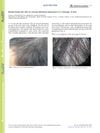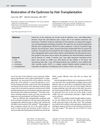 7 citations,
May 2005 in “Experimental Dermatology”
7 citations,
May 2005 in “Experimental Dermatology” Two mouse mutations cause similar hair loss despite different skin changes.
[object Object]  7 citations,
April 1999 in “Dermatologic Clinics”
7 citations,
April 1999 in “Dermatologic Clinics” High-quality photos help track hair growth progress in androgenetic alopecia patients.
 2 citations,
June 2005 in “Clinical Oncology”
2 citations,
June 2005 in “Clinical Oncology” A man's bald spot grew hair after starting cancer treatment with gefitinib.
 July 2024 in “International Journal of Dermatology Venereology and Leprosy Sciences”
July 2024 in “International Journal of Dermatology Venereology and Leprosy Sciences” The hair growth serum effectively reduced hair fall, promoted growth, and increased hair thickness and density without side effects.
 1 citations,
January 2018 in “Acta dermato-venereologica”
1 citations,
January 2018 in “Acta dermato-venereologica” A teenager's hair with alternating white and dark bands, known as Pili annulati, is a genetic condition that is usually harmless and often considered attractive.
 January 2022 in “Skin appendage disorders”
January 2022 in “Skin appendage disorders” A woman with alopecia totalis regrew dark hair in bands after using a corticosteroid ointment.
 16 citations,
July 2007 in “Facial Plastic Surgery Clinics of North America”
16 citations,
July 2007 in “Facial Plastic Surgery Clinics of North America” The document suggests using fat grafting and laser therapy to improve the aging Asian face and hair restoration techniques tailored to Asian hair characteristics, emphasizing natural results and cultural sensitivity.
 1 citations,
January 2020 in “The Egyptian Journal of Plastic and Reconstructive Surgery”
1 citations,
January 2020 in “The Egyptian Journal of Plastic and Reconstructive Surgery” PRP or nanofat injections improve scar tissue quality but don't significantly boost hair transplant results for scarring hair loss.
 8 citations,
July 2014 in “Hair transplant forum international”
8 citations,
July 2014 in “Hair transplant forum international” Bio-enhanced hair restoration, using methods like growth factors, stem cells, and ATP, results in better hair growth and density than traditional hair transplants.
1 citations,
March 2024 in “Life” Dermoscopy can help assess the severity of chronic radiation-induced skin damage in head and neck cancer patients.
 67 citations,
November 2019 in “Molecules”
67 citations,
November 2019 in “Molecules” Tea, especially green tea, shows promise in cosmetics for skin and hair benefits but more research is needed for effective use.
 2 citations,
September 2009 in “Nurse Prescribing”
2 citations,
September 2009 in “Nurse Prescribing” PCOS affects many women, causing various symptoms and health risks, and is managed through lifestyle changes, medication, and support groups.
 43 citations,
October 2003 in “Journal of The American Academy of Dermatology”
43 citations,
October 2003 in “Journal of The American Academy of Dermatology” Hair transplanting is a useful, often overlooked treatment for female pattern hair loss.
 June 2012 in “Springer eBooks”
June 2012 in “Springer eBooks” Eating disorders can cause various hair problems, and while hair loss in these disorders is linked to metabolic syndrome, treatment focuses on specific medications and lifestyle changes for the syndrome.
37 citations,
January 2005 in “Clinics in dermatology” Recent progress has been made in understanding inherited hair and nail disorders.
 July 2024 in “Journal of Cosmetic Dermatology”
July 2024 in “Journal of Cosmetic Dermatology” Vegan collagen builder improves hair growth, skin smoothness, and reduces wrinkles and pain.
 30 citations,
September 2017 in “Clinics in Dermatology”
30 citations,
September 2017 in “Clinics in Dermatology” Acanthosis nigricans is a skin condition that may indicate a higher risk for insulin resistance and type 2 diabetes, and more research is needed to understand and treat it.
 January 2012 in “Elsevier eBooks”
January 2012 in “Elsevier eBooks” Hair transplantation is highly effective with careful technique and attention to patient needs.
 7 citations,
May 2014 in “Clinical practice”
7 citations,
May 2014 in “Clinical practice” Cooling the scalp may prevent hair loss from chemotherapy, hair often grows back after treatment, and nail issues usually improve after stopping the drug.
 25 citations,
January 2001 in “Facial Plastic Surgery”
25 citations,
January 2001 in “Facial Plastic Surgery” Both tissue expansion and serial excision are effective for scar revision in the head and neck area.
 10 citations,
May 2014 in “Facial Plastic Surgery”
10 citations,
May 2014 in “Facial Plastic Surgery” Hair transplantation using PLFUT is effective for eyebrow restoration with natural-looking results and no scarring.
 10 citations,
May 2018 in “Nutrition and Cancer”
10 citations,
May 2018 in “Nutrition and Cancer” Certain spices may help prevent and treat skin cancer, but more human trials are needed.
 2 citations,
March 2005 in “Journal of the American Academy of Dermatology”
2 citations,
March 2005 in “Journal of the American Academy of Dermatology” Wigs are still a popular solution for hair loss to maintain a youthful look.
 23 citations,
January 2018 in “Elsevier eBooks”
23 citations,
January 2018 in “Elsevier eBooks” Nanoemulsions improve stability and delivery of active ingredients in cosmetics for skin and hair care.
[object Object] 
Regenerative cosmetics can improve skin and hair by reducing wrinkles, healing wounds, and promoting hair growth.
 10 citations,
December 2015 in “Clinics in Dermatology”
10 citations,
December 2015 in “Clinics in Dermatology” Diabetes can lead to blindness and skin problems, and managing blood sugar and blood pressure is crucial to prevent these complications.
 42 citations,
July 2015 in “Cosmetics”
42 citations,
July 2015 in “Cosmetics” Nanotechnology improves hair care products by enhancing ingredient stability, targeting treatment, and reducing side effects, but more research on its toxicity is needed.
 5 citations,
March 2013 in “International journal of surgical pathology”
5 citations,
March 2013 in “International journal of surgical pathology” Cronkhite-Canada syndrome can be diagnosed without gastrointestinal polyps if there is severe mucosal atrophy and edema.

The document concludes that activating hair roots is important for improving hair growth and preventing hair loss.
 April 2021 in “Arab Journal of Nuclear Sciences and Applications/Arab Journal of Nuclear Sciences and Applications ”
April 2021 in “Arab Journal of Nuclear Sciences and Applications/Arab Journal of Nuclear Sciences and Applications ” Repeated use of protein hair conditioner with heat or gamma irradiation can harm skin and hair health in rats.




























